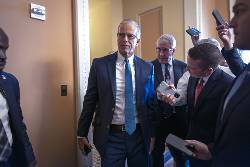WASHINGTON (AP) — The Senate is expected to grind through a rare weekend session as Republicans race to pass President Donald Trump's package of tax breaks and spending cuts by his July Fourth deadline.
Republicans are using their majorities in Congress to push aside Democratic opposition, but they have run into a series of political and policy setbacks. Not all GOP lawmakers are on board with proposals to reduce spending on Medicaid, food stamps and other programs as a way to help cover the cost of extending some $3.8 trillion in Trump tax breaks.
The 940-page bill was released shortly before midnight Friday. Senators were expected to take a procedural vote Saturday to begin debate on the legislation, but the timing was uncertain and there is a long path ahead, with at least 10 hours of debate time and an all-night voting session on countless amendments.
Senate passage could be days away, and the bill would need to return to the House for a final round of votes before it could reach the White House.
“It's evolving,” said Senate Majority Leader John Thune, R-S.D., as he prepared to close up the chamber late Friday.
The weekend session could be a make-or-break moment for Trump's party, which has invested much of its political capital on his signature domestic policy plan. Trump is pushing Congress to wrap it up, even as he sometimes gives mixed signals, allowing for more time.
At recent events at the White House, including Friday, Trump has admonished the “grandstanders” among GOP holdouts to fall in line.
“We can get it done,” Trump said in a social media post. “It will be a wonderful Celebration for our Country.”
The legislation is an ambitious but complicated series of GOP priorities. At its core, it would make permanent many of the tax breaks from Trump's first term that would otherwise expire by year's end if Congress fails to act, resulting in a potential tax increase on Americans. The bill would add new breaks, including no taxes on tips, and commit $350 billion to national security, including for Trump's mass deportation agenda.
But the spending cuts that Republicans are relying on to offset the lost tax revenues are causing dissent within the GOP ranks. Some lawmakers say the cuts go too far, particularly for people receiving health care through Medicaid. Meanwhile, conservatives, worried about the nation's debt, are pushing for steeper cuts.
Sen. Thom Tillis, R-N.C., said he is concerned about the fundamentals of the package and will not support the procedural motion to begin debate.
“I'm voting no on the motion to proceed,” he said.
Sen. Ron Johnson, R-Wis., pushing for deeper cuts, said he needed to see the final legislative text.
The release of that draft had been delayed as the Senate parliamentarian reviewed the bill to ensure it complied with the chamber’s strict “Byrd Rule,” named for the late Sen. Robert C. Byrd, D-W.Va. It largely bars policy matters from inclusion in budget bills unless a provision can get 60 votes to overcome objections. That would be a tall order in a Senate with a 53-47 GOP edge and Democrats unified against Trump’s bill.
Republicans suffered a series of setbacks after several proposals were determined to be out of compliance by the chief arbiter of the Senate's rules. One plan would have shifted some food stamp costs from the federal government to the states; a second would have gutted the funding structure of the Consumer Financial Protection Bureau.
But over the past days, Republicans have quickly revised those proposals and reinstated them.
The final text includes a proposal for cuts to a Medicaid provider tax that had run into parliamentary objections and opposition from several senators worried about the fate of rural hospitals. The new version extends the start date for those cuts and establishes a $25 billion fund to aid rural hospitals and providers.
Most states impose the provider tax as a way to boost federal Medicaid reimbursements. Some Republicans argue that is a scam and should be abolished.
The nonpartisan Congressional Budget Office has said that under the House-passed version of the bill, some 10.9 million more people would go without health care and at least 3 million fewer would qualify for food aid. The CBO has not yet publicly assessed the Senate draft, which proposes steeper reductions.
Top income-earners would see about a $12,000 tax cut under the House bill, while the poorest Americans would face a $1,600 tax increase, the CBO said.
One unresolved issue remains the so-called SALT provision, a deduction for state and local taxes that has been a top priority of lawmakers from New York and other high-tax states. The cap is now $10,000.
The White House and House Republicans had narrowed in on a plan for a $40,000 cap, but for five years instead of 10. Republican senators says that's too generous. At least one House GOP holdout, Rep. Nick LaLota of New York, said he cannot support the compromise.
Senate Democratic leader Chuck Schumer of New York said Republicans are rushing to finish the bill before the public fully knows what’s in it.
“There’s no good reason for Republicans to chase a silly deadline,” Schumer said.
House Speaker Mike Johnson, who sent his colleagues home for the weekend with plans to be on call to return to Washington, said they are “very close” to finishing up.
“We would still like to meet that July Fourth, self-imposed deadline,” said Johnson, R-La.
With the narrow Republicans majorities in the House and Senate, leaders need almost every lawmaker on board to ensure passage. Johnson and Thune have stayed close to the White House, relying on Trump to pressure holdout lawmakers.
___
Associated Press writers Kevin Freking and Joey Cappelletti contributed to this report.
...


 Copyright © 1996 - 2025 CoreComm Internet Services, Inc. All Rights Reserved. | View our
Copyright © 1996 - 2025 CoreComm Internet Services, Inc. All Rights Reserved. | View our